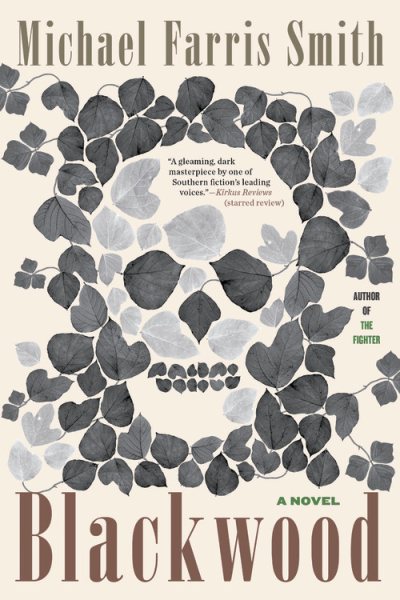Interview by Jana Hoops. Special to the Clarion-Ledger Sunday print edition (March 8)
 Oxford’s Michael Farris Smith reinforces his rising prominence as “one of Southern fiction’s leading voices” with his newest Southern noir offering, Blackwood.
Oxford’s Michael Farris Smith reinforces his rising prominence as “one of Southern fiction’s leading voices” with his newest Southern noir offering, Blackwood.
Set in “a landscape of fear and ghosts,” this tale of an artist who returns to his (fictional) hometown of tiny Red Bluff, Miss., quickly turns dark as he realizes that the heartbreak of his past is now mingled with an evil that has tortured generations.
The recipient of the 2014 Mississippi Author Award, Smith’s previous novels include The Fighter, Desperation Road, Rivers, and The Hands of Strangers. His short stories have received two nominations for a Pushcart Prize, and his essays have been published in the New York Times, Catfish Alley, Deep South Magazine and others.
Smith is a graduate of Mississippi State University, and he began writing while at the Center for Writers at the University of Southern Mississippi.
As a child in 1956, main character Colburn inadvertently witnessed–and unexpectedly participated in–his father’s suicide. The weight of this, his greatest burden, soon begins to drag him into deeper gloom when he returns to his hometown of Red Bluff, Miss., 20 years later. Why did he really go back, and why did you choose to set this story in this time period?

Michael Farris Smith
I think I chose to set the novel in the ‘70s, with the initial event occurring in the ‘50s, just because this felt like an older story to me. Almost like a tall tale or ghost story you hear told again and again in some small town. I think a lot of people from smaller places can certainly relate to this. As to why Colburn decides to return, I don’t know if it’s something I can answer so directly. He’s been carrying this around for a long time, he’s haunted by it, confused by it, curious about it, and so maybe he feels like he’s ready to face it.
Another formidable, undeniable “character” in Blackwood is the kudzu–the living, invincible vine that could swallow not only the landscape, but any manmade object in its path. Explain its role in this story.
The kudzu is what started this story, much like the idea of endless hurricanes started Rivers. This is the second time I’ve had the landscape be the jumping off point. I’ve always thought the great expanse of kudzu was strange, spooky, dark. We’ve all seen it, how it takes everything, methodically and patiently. I just had the idea of a valley covered in kudzu and the small town surrounding it, and the whispers and maybe even madness that seems to be living on its edge, and then going beneath the vines to find out what is going on. I let my imagination have it and that was that.
“The voice” seems to pervade the community. Tell us about its intrusion into the lives of those who hear it, and its gossip value among those who have merely heard about it.
The gossip value carries some of the weight, no doubt. Back to earlier when I mentioned that Blackwood had the feeling of being a ghost story passed along, year after year, I think the characters in the novel experience the same. One person claims to hear the voice. Another thinks it’s ridiculous. Another falls somewhere in between. It seems like those who are drawn to the notion of a voice below are the ones who want to hear it.
Among the many story lines and characters whose lives are beyond “complicated” in this tale is the presence of characters known as the man, the woman, and the boy–who all live tragic lives. In the end, it is the boy with whom Colburn finds an attachment. Why is this quasi-relationship so important to Colburn?
The best way I can answer is that we are all looking for someone to find things in common with, people who make us feel accepted or part of something. Hopefully it comes from family, but for too many people, like Colburn, that isn’t the case. He’s spent a lifetime with the shadows of his mother and father drifting in his mind, and he has been a loner, isolated, and maybe this is his chance to find that connection he has missed.
The names of the woman and the boy are never revealed, although the man finally tells the local sheriff, “My name is Boucher.” You know what my question is! How does this fit in with the main character of your previous novel, The Fighter?
I’ve never had characters spill from one novel into another until now, and that wasn’t the original plan. I was very late in the process of Blackwood when I realized the man and woman who have broken down in Red Bluff are the man and woman who abandoned young Jack Boucher in Tunica at the beginning of The Fighter. It was such an exciting idea, and the time frame fit, and it gave their story so much more complexity. It raised Blackwood to a higher level, and in some ways, I feel like it has raised the level of The Fighter, as well.
Please tell me about the title of the book, Blackwood, and its significance to the story.
On page 56, I used the description of the “blackwood underneath” in a passage where we first really go under and see what it’s like. As soon as I used the word blackwood, I knew that was the title. It fit the landscape but also fit the kind of story I knew I was going to tell.
Lemuria has chosen Blackwood as its March 2020 selection for its First Editions Club for Fiction. Signed first editions can be found at Lemuria and at our online store.


Comments are closed.